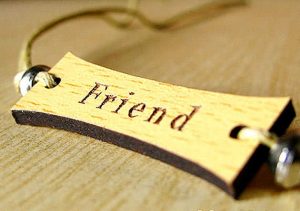However, when I come to the university, I don’t have friends again. It makes me feel sad, particularly when I see others become so close to each other as friends while I never get to be close to anyone. My relationship with people is always so superficial and it never gets deep. To be honest, I really crave for the friendship or even a romantic relationship, and I think this has been the biggest dream of my life.
But right now I am feeling hopeless about it. Sometimes, when I am socializing with others, I just feel so sad as I think we won’t be friends. We are just superficial ‘friends’. But I always have to pretend that I am happy. Do you have any advice on how I can change this lifelong situation to have more close friends?
Answer
In this counseling answer:
• Start a journal writing down your daily thoughts about yourself.
• List all of the good qualities you have as a friend and list the qualities you seek to a friend.
• Be the one who initiates these activities and qualities to show others you are interested in being a friend.
• Be careful who you chose as friends so it does not impact your faith negatively.
• Try to be more outgoing in being a friend, displaying the qualities you seek.
As-Salamu ’Alaikum,
It is human nature to want to bond and connect with others. It is how Allah (swt) made us.
Positive, close, nurturing relations are important in life.
Social interactions learned early on, often become patterns in which we keep throughout our adult life.
If our early feelings of self were not nurtured or positive, or if we suffered from low self-esteem, it often can affect future relationship building – if we let it.
I would kindly suggest you do two things, in sha’ Allah.
Start a journal writing down your daily thoughts about yourself, what you accomplished, what you did, who you met, and any social activities you engaged in and how you felt.
Then I ask you to see if there are any patterns in your thought processes or behaviors and how you relate to others.

Next, please make a list of definitions and meanings of “friends”, “superficial” “meaningful” and other descriptions of friendships.
Perhaps, you possess close friends already but do not recognize it.
You obviously are capable of making friends as you did so in secondary school.
However, the point you made that you had friends because they “accepted you” makes me ask, why would they not?
I would kindly suggest making another list. List all of the good qualities you have as a friend and list the qualities you seek to a friend.
When meeting people or hanging out socially, do you feel you are acting as a good friend? Or do you let insecurities or obsessive thoughts of “we won’t be friends” get in the way? It is often said that to have friends is to be a friend.
About Relationships talks about friendships stating, “It’s a not perfect world, but in terms of friendship, someone who is genuinely a friend usually: Has told you that you are a friend or has introduced you as their friend; Has called or emailed you about meeting for coffee, lunch, etc.;
Has done something nice for you; Is sincerely interested when you talk about your life; Roots for you and wants the best for you; Is willing to hang out with you outside of the place you first met (work, social gathering, exercise class)”.
Do you see or feel any of these qualities in your current circle of friends? If so, you are blessed! If you do not, be the one who initiates these activities and qualities to show others you are interested in being a friend.
Don’t wait until others step forward; you should take the first steps.
I know it may be difficult and you may feel awkward or shy, but the more you do it, the more you reach out, the easier it will become for you. Additionally, others will see you are friendly and will, in sha’ Allah, respond in same!
Check out this counseling video:
In sha’ Allah, if you step out, take chances with others, not worry about being accepted, and just be your natural wonderful self, people will pick up on your genuine natural energy and be drawn to your outgoing personality.
This is not to say you have to be “the life of the party”, so to speak, but what it does mean is that one cannot just sit passively back and expect others to constantly be the one to engage.
Often times, when we are shy or have low self-esteem, we tend to be more quiet, more secluded at social events, and more cautious when people are trying to make friends with us.
Making friends within Islam should be easy; however, keep in mind what the Qur’an says about friendship:
“And (remember) the day when the unjust one shall bite his hands saying: O! Would that I had taken a way with the Messenger! O woe is me! Would that I had not taken such a one for a friend! Certainly he led me astray from the reminder after it had come to me. Ah! The Evil One is but a traitor to man!” (25:27-29)
Thus, the kinds of friends we chose are important. Often times, in our desire to connect with others, we chose the wrong type of friends – just to have friends.
Be careful who you chose as friends so it does not impact your faith negatively.
Chose friends whom you have things in common with, those that keep their prayers, love Allah (swt), and our beloved Prophet (saw), and who hold up the tenets of Islam.
These friendships will be true, lasting, and spiritually beneficial, in sha’ Allah.
My father use to tell me to chose my friends wisely, and that if in my entire life time I could count on one hand (4 fingers and a thumb) true friends, then I was blessed.
He gave me wise advice because we do not need a whole crew of friends, only a few close friends whom we can journey through this life together.
This is not to say we will be together every day, but even if we do not talk for months due to family, college, children and other life obligations, we can always know that when we do talk, we will feel as if we talked yesterday.
As far as romantic relationships, that will come in time, and as Muslims, we know that romance is confined to the marriage relationship, not the friends’ category.
That friend will, in sha’ Allah, be your closet and best friend of all.
Kindly, make the lists and journal so you can determine your definitions and expectations, and put them in a realistic view.
Try to be more outgoing in being a friend, displaying the qualities you seek.
Finally, try not to think too much about it as your worries may subconsciously be perceived by that person.
They may see you caught up in thought and not fully engaged in the conversation or social activity, thus giving the impression that they are boring you!
Make du’aa’ that Allah (swt) bring good, Islamic friends your way as friends are the blessing.
I am confident you will have nice, close friends. Just relax, engage, and enjoy the socializing moments you are spending with others. We wish you the best you are in our prayers.
Salam,
***
Disclaimer: The conceptualization and recommendations stated in this response are very general and purely based on the limited information that was provided in the question. In no event shall AboutIslam, it’s volunteers, writers, scholars, counselors, or employees be held liable for any direct, indirect, exemplary, punitive, consequential or other damages whatsoever that may arise through your decision or action in the use of the services which our website provides.


